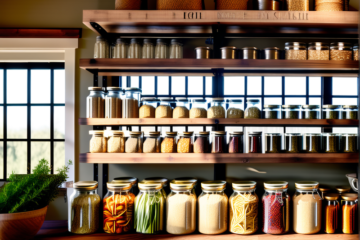Your kitchen appliances and tools are essential for preparing meals, making everyday cooking a breeze. However, with regular use, they are prone to wear and tear. Proper care and maintenance can significantly extend their lifespan, ensuring you get the most value from your investment. Here’s how to take care of your kitchen appliances and tools to keep them in excellent working condition for years to come.
1. Read the Manufacturer’s Manual
Before using any new appliance or tool, take the time to read the manufacturer’s manual. It contains essential information about the correct usage, cleaning instructions, and troubleshooting tips. Following these guidelines can prevent unnecessary damage and ensure optimal performance.
2. Clean Regularly
Regular cleaning is crucial to maintaining kitchen appliances and tools. Food particles, grease, and grime can build up over time, leading to malfunctions or reduced efficiency. Use appropriate cleaning agents and methods for each item:
- Blenders and Food Processors: Disassemble and wash parts thoroughly. Avoid submerging motorized bases in water; instead, wipe them with a damp cloth.
- Microwaves: Wipe the interior with a damp cloth after each use to prevent food buildup. Use a bowl of water and vinegar to steam-clean stubborn stains.
- Knives: Hand wash knives immediately after use and dry them thoroughly to prevent rust.
3. Avoid Overloading Appliances
Appliances like blenders, food processors, and dishwashers have limits on how much they can handle at once. Overloading can strain the motor or cause components to break. Be mindful of the recommended capacities and operate appliances within their limits.
4. Store Properly
Proper storage prevents damage and keeps tools and appliances ready for use:
- Knives: Use a knife block, magnetic strip, or blade guards to protect edges and prevent accidents.
- Small Appliances: Store appliances in dry, cool areas to avoid exposure to moisture and heat, which can damage electrical components.
- Cookware: Stack non-stick pans with protective liners to avoid scratches.
5. Sharpen and Maintain Tools
Tools like knives and scissors need regular sharpening to perform efficiently. Dull blades require more force, increasing the risk of accidents and causing damage to the tools themselves. Use a sharpening stone or take them to a professional sharpener periodically.
6. Inspect for Wear and Tear
Regularly check your appliances and tools for signs of wear and tear. Replace frayed cords, cracked components, or worn-out parts immediately to prevent further damage or potential hazards. Many manufacturers offer replacement parts to help you maintain your appliances.
7. Use Correct Accessories
Using non-compatible accessories or attachments can damage appliances or reduce their effectiveness. Stick to manufacturer-recommended parts and accessories to ensure the best performance and avoid unnecessary wear.
8. Avoid Abrasive Cleaners
Harsh cleaning agents or abrasive scrubbers can damage the surfaces of appliances and tools. For example:
- Non-stick cookware should be cleaned with soft sponges to preserve the coating.
- Stainless steel appliances benefit from dedicated cleaners that maintain their shine without scratching.
9. Keep Appliances Dry
Moisture is one of the biggest enemies of electrical appliances. After cleaning, ensure all components are completely dry before reassembling or storing. This prevents rust and protects electrical parts from short-circuiting.
10. Perform Regular Maintenance
Some appliances require periodic maintenance to stay in top condition:
- Coffee Makers: Descale regularly to remove mineral buildup.
- Refrigerators: Vacuum condenser coils every few months to improve efficiency.
- Ovens: Clean spills promptly and perform deep cleaning as needed to prevent buildup that can affect performance.
11. Unplug When Not in Use
Unplug appliances when they’re not in use to prevent electrical surges from damaging internal components. This simple step can extend the lifespan of small appliances like toasters and blenders.
12. Invest in Quality
Finally, invest in high-quality tools and appliances from reputable brands. While they may cost more upfront, they often last longer and perform better, saving you money in the long run.
Conclusion
Taking proper care of your kitchen appliances and tools is not only a matter of cleanliness but also an investment in their longevity and efficiency. By following these tips, you’ll ensure your kitchen remains functional and your culinary adventures continue without interruptions. A little effort today can save you from costly repairs or replacements down the line.




